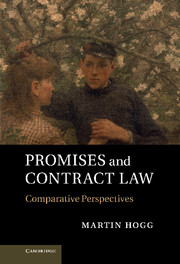Preface
Published online by Cambridge University Press: 05 August 2011
Summary
Preface
It is the thesis of this work that promise has played an important role in the contract law not only of those jurisdictions whose legal culture derives directly and unashamedly from Roman law and the medieval ius commune but also in those systems forming part of the Common law world, systems which are somewhat more reticent in acknowledging a debt to Roman or medieval European legal influences. The importance of promise in contract law derives from a mixture of sources: from the natural law tradition of Aristotle, Aquinas, and the late scholastics; from Roman law itself; from the canon law; and from the emphasis placed in later centuries upon the will, of which the promise is one specific manifestation. It is argued that, while promise was the paradigm voluntary obligation in medieval and early modern law, its primacy was largely supplanted by a model of agreement with the contract as its concrete expression, one in which promise was relegated largely to a description of the nature of agreement (as an exchange of promises) and of some unusual transactions which could not easily be accommodated within an agreement model, such as the promise of reward. Promise survived, however, as a discrete obligation in one European system, that of Scotland, and the functions which it is capable of performing in that system offer some inspiration for a possible rediscovery of the value of promise in other systems. Many transactions analysed in this work are only with difficulty fitted into a contractual model, whereas, it will be argued, it would be more honest to recognise that the unreciprocated or unilateral promise provides a neater and more apposite explanation for the basis of liability. It will also be suggested that the promise in the wider sense of a contractual promise is a concept which still illuminates much of the substantive content of contract law, despite attacks which have been made against promise by the reliance theory of obligational liability and other non-promissory theories.
Information
- Type
- Chapter
- Information
- Promises and Contract LawComparative Perspectives, pp. xiii - xvPublisher: Cambridge University PressPrint publication year: 2011
